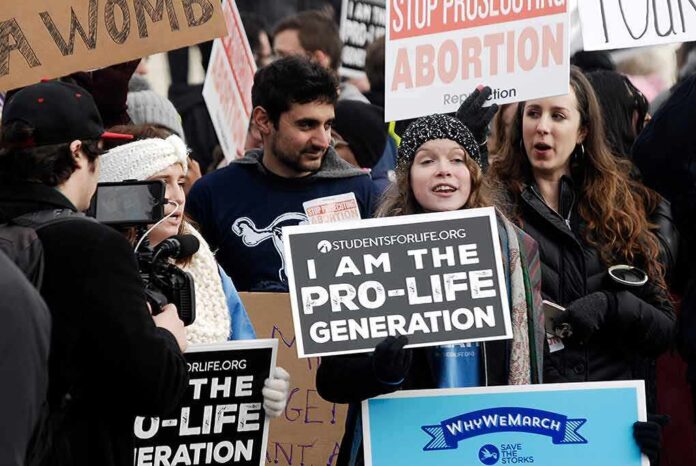Republicans in Congress are pushing forward a bold plan to redirect federal funds from abortion providers like Planned Parenthood to pro-life organizations, setting up a major battle over healthcare priorities and taxpayer funding.
Quick Takes
- House Speaker Mike Johnson and Republicans are working on a budget plan to redirect funds from “big abortion” to federally qualified health centers and pro-life organizations
- Over 150 pro-life groups have signed a letter urging Congress to cut Medicaid funding for Planned Parenthood
- Planned Parenthood received $699.3 million in government funding (39% of its revenue) while performing 392,715 abortions, according to its recent report
- Republicans are attempting to use the budget reconciliation process to pass the funding changes with a simple majority
- The Supreme Court will hear a case on South Carolina’s attempt to strip Medicaid funding from Planned Parenthood
Republican Budget Plan Takes Aim at Abortion Funding
House Republicans are actively considering measures to end federal funding for abortion providers like Planned Parenthood as part of broader cost-saving efforts in a multitrillion-dollar bill supporting President Trump’s agenda. The House Energy & Commerce Committee, tasked with finding $880 billion in spending cuts, has included discussions about potential defunding of Planned Parenthood in their deliberations. Committee Chairman Brett Guthrie, R-Ky., confirmed these discussions, stating, “We are working on a lot of different options, but that’s been discussed.”
House Speaker Mike Johnson has indicated plans to redirect funds from abortion providers to federally qualified health centers that provide comprehensive healthcare services. While not specifically naming Planned Parenthood, the target of these funding changes is clear to observers on both sides of the abortion debate. Republicans aim to use the budget reconciliation process, which allows passage of legislation with a simple majority and bypasses the need for 60 votes in the Senate.
Pro-Life Coalition Pressures Congress
A unified coalition of more than 150 pro-life organizations has signed a letter urging Congress to cut Medicaid funding for Planned Parenthood and similar centers. This “Defund Planned Parenthood” initiative has gained significant momentum with Trump’s presidency and Republican control of Congress. The movement represents one of the most coordinated efforts to date by anti-abortion groups to eliminate government funding for abortion providers.
“Today is a historic moment where the pro-life movement stands united behind one message: Defund Planned Parenthood,” said Kristan Hawkins, president of Students for Life of America.
Rep. Mary Miller, R-Ill., has expressed strong support for including provisions to defund Planned Parenthood through the reconciliation bill, stating, “Congress holds the power of the purse, and President Trump has begun the defunding of Planned Parenthood.” Alongside these budget discussions, Congressional Republicans have introduced multiple pieces of legislation aimed at permanently banning federal abortion funding, including bills by Rep. Chris Smith, Senator Roger Wicker, and Senator Rand Paul.
Funding Debate Centers on Medicaid Dollars
According to the most recent annual report from Planned Parenthood, the organization received $699.3 million in government reimbursements and grants, accounting for 39% of its total revenue, while performing 392,715 abortions. The Hyde Amendment already prevents federal funds from being used directly for abortions, but critics argue that federal Medicaid dollars indirectly support the abortion industry by funding organizations that also perform abortions.
“Absolutely zero taxpayer dollars should be going to abortion,” stated Senator Tommy Tuberville, reflecting the position of many Republicans pushing for the funding changes.
Not all Republicans are fully on board with the defunding strategy. One House Republican who asked to remain anonymous questioned the approach, saying, “I don’t even know what they’re defunding, because you already can’t use federal funds for abortion.” Planned Parenthood maintains that its Medicaid funding supports other reproductive health services like contraceptive care, STI testing, and cancer screenings, which constitute the majority of its services.
Potential Healthcare Impact and Legal Challenges
Opponents of the defunding effort warn that eliminating federal funding could impact healthcare access for millions, especially in low-income communities with limited healthcare options. Planned Parenthood representatives argue that the organization’s broader reproductive health services would be compromised by the proposed funding cuts, affecting patients who rely on them for non-abortion healthcare.
“We should be expanding health care to low-income people rather than trying to kick off these people who rely on us for health care,” said Vicki Ringer, a Planned Parenthood spokesperson in South Carolina.
The funding battle comes as the Supreme Court prepares to hear a case on South Carolina’s attempt to strip Medicaid funding from Planned Parenthood, which could have far-reaching implications for similar efforts nationwide. No final decisions have been made on the Republican budget proposal, and provisions to defund Planned Parenthood may still be modified or excluded from the final bill as negotiations continue.
Sources:
- https://www.plannedparenthoodaction.org/pressroom/planned-parenthood-action-fund-statement-on-passage-of-house-republicans-budget-resolution-to-strip-health-care-access-cruel-and-consequential
- https://apnews.com/article/abortion-medicaid-trump-planned-parenthood-supreme-court-c512ec676b99d521d240bedeb7f85574
- https://www.foxnews.com/politics/scoop-republicans-discuss-defunding-big-abortion-like-planned-parenthood-trump-agenda-bill
- https://www.lifesitenews.com/news/republicans-weigh-budget-plan-to-defund-planned-parenthood-redirect-money-to-pro-life-centers/











